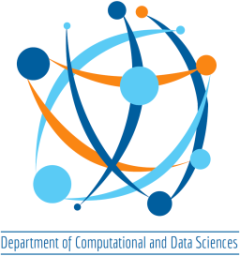DEPARTMENT OF COMPUTATIONAL AND DATA SCIENCES
Ph.D. Thesis Colloquium
__________________________________________________________________________________________
Speaker : Ms. Deepa Maheshvare
S.R. Number : 06-18-01-10-12-16-1-14025
Title : “Modeling physiological transport at scales: connecting cells to organs.”
Research Supervisor: Prof. Debnath Pal
Date & Time : August 11, 2023 (Friday) at 11:00 AM
Venue : Room No. 102 (CDS Seminar Hall)
__________________________________________________________________________________________
Abstract
The physiological system is a complex network in which each organ forms a subsystem, and different subsystems interact to maintain the body’s overall homeostasis. Within each subsystem, functional networks exist at different levels of complexity. The vessels that perfuse the cells within a tissue mediate short- and long-distance communication. The ability to simultaneously capture local and global dynamics by hierarchically bridging communication networks at different scales is a key challenge in holistic physiology modeling.
We present a scalable hierarchical framework that allows us to bridge diverse scales to model biochemicals’ production, consumption, and distribution in a tissue microenvironment. We developed a discrete modeling framework to simulate the gradient-driven advection–dispersion-reaction physics of multispecies transport in multiscale systems. Biochemical drift in the capillary network, transcapillary exchange, and cellular reactions were modeled by translating physical space into a metamodel with functional units. We define graph operators on the finite connected network representation of the discrete functional units embedded in the metamodel. The governing differential equations are modeled to study the inter-compartment dynamics of the well-mixed nodal volumes by formulating the transport dynamics in the vascular domain and the transcapillary exchange as a ‘tank-in-series’ model. This allows our framework to scale to large networks and provides the flexibility to fuse multiscale models by encoding imaging data of vascular topology and omics data of cellular reactions to enhance systems-level understanding. Our framework is suitable for reducing the computational cost of spatially discretizing large tissue volumes and for probing the effect of flow topology on biochemical transport to study structure-function relationships in tissues.
Next, we developed a comprehensive and standardized data-driven modeling workflow to build kinetic models of cellular metabolism. There are significant challenges in developing computational models at the cellular level due to the substantial variation in data across different experimental systems, animal species, and cell lines. We have created open, free, and FAIR (findable, accessible, interoperable, and reusable) assets that can be used to study pancreatic physiology and glucose-stimulated insulin secretion (GSIS). The data curation, integration, normalization and data fitting workflow, and a large database of metabolic data of the pancreatic beta-cell based on experimental and clinical data from 39 studies spanning 50 years of pancreatic, islet, and beta-cell research in humans, rats, mice, and cell lines were used to construct a novel data-driven kinetic SBML (Systems Biology Markup Language) model of GSIS in the pancreatic beta-cell. The model consists of detailed glycolysis and phenomenological equations for biphasic insulin secretion coupled to cellular energy state, ATP dynamics, and (ATP/ADP ratio). The predicted glucose-dependent response of glycolytic intermediates and biphasic insulin secretion are in good agreement with experimental measurements, and our model predicts that the factors affecting ATP consumption, ATP formation, hexokinase, phosphofructokinase, and ATP/ADP-dependent insulin secretion have a major effect on GSIS.
Finally, we present KiPhyNet, an online network simulation tool connecting cellular kinetics and physiological transport. The tool allows users to simulate and interactively visualize pressure, velocity, and concentration fields for applications such as flow distribution, glucose transport, and glucose-lactate exchange in microvascular networks.
When extended for translational purposes in clinical settings, the framework and pipeline developed in this work can advance the simulation of whole-body models and are expected to have major applications in personalized medicine and drug discovery.
===============================================================================
ALL ARE WELCOME



